#mortuary 1983
Explore tagged Tumblr posts
Text










Scream King - Bill Paxton
#horror#horror movies#horror movie#gifs#gif#horror gifs#horror gif#my gif post#horroredit#horror edit#bill paxton#aliens 1986#aliens movie#my gif#my gifs#near dark#near dark 1987#frailty 2001#brain dead 1990#brain dead#mortuary 1983#Predator 2#butcher baker nightmare maker#club dread#the terminator#the terminator 1984#the colony#the colony 2013#screamking#scream king
338 notes
·
View notes
Text
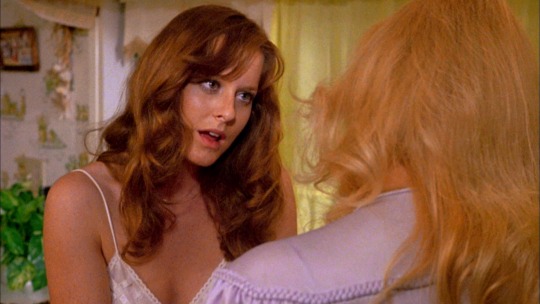
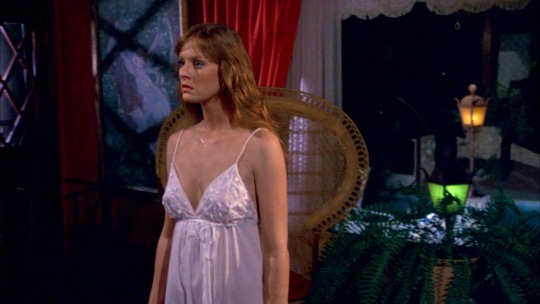
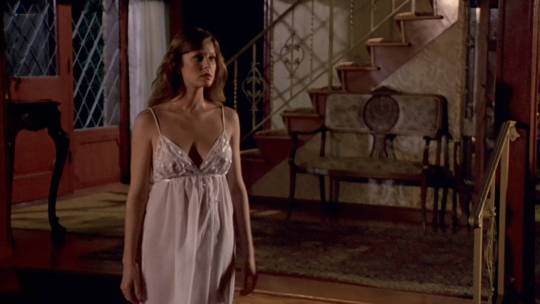
Mary McDonough in Mortuary (1982/1983)
(I do not own these images)
#mary mcdonough#mary beth mcdonough#mary elizabeth mcdonough#mortuary#the waltons#mortuary 1982#mortuary 1983
25 notes
·
View notes
Text

Research notes (please ignore the psychic energy)
#1983-1989 was a bad time LMAO#enjoy the 80s!! everyone dies and you get divorced 0_0#the mortuary assistant#the rest of the fandom should benefit from this timeline (<- delusional)#that giant gap between 67-77 is soooooooOOOO#that’s the info I was looking for and it doesn’t even exist#which I guess is an excellent reason for me to have not remembered what happened there but#girl I’m curios
4 notes
·
View notes
Text

Mortuary 1983
1 note
·
View note
Text

W A T C H I N G
#MORTUARY (1983)#Bill Paxton#Mary Beth McDonough#David Wallace#Lynda Day George#Christopher George#Donna Garrett#Denis Mandel#horror#mystery#suspense#watching
1 note
·
View note
Note
I absolutely love your style and was wondering as a cinemaphile what obscure, off the wall horror movies would you suggest for the spooky season?
Uhhhh how about various levels of obscure from the 80s and 90s? (Not a complete lists because I’ve seen literally thousands of films and forget half of what I watch and use Letterboxd to keep track)
1999– Idle Hands, Don’t Look Under the Bed, Bats, Ravenous, In Dreams, Lighthouse, Stir of Echos, Audition, Kolobos
1998—The Last Broadcast, Devil in the Flesh, Whispering Corridors, Urban Legend, Shadowbuilder, The Eternal, The Quiet Family, Strangeland, Deep Rising, The Wisdom of Crocodiles, Tomie
1997– The Relic, The Ugly, Event Horizon, Cure, Wax Mask, Snow White: A Tale of Terror, Quicksilver Highway, Office Killer, The Night Flier
1996– From Dusk til Dawn, Little Witches, Uncle Sam, The Frighteners, The Dentist, Karmina, Thesis, Tromeo & Juliet,
1995– Blood & Donuts, Screamers, Tales from the Hood, The Demolitionist, Mushrooms, The Girl With the Hungry Eyes, The Day of the Beast, Serpent’s Lair, Rumpelstiltskin, Mute Witness, Evil Ed, Project: Metalbeast, Habit, The Addiction, Tales From the Crypt: Demon Knight, Lord of Illusions
1994– Tammy & the T Rex, In the Mouth of Madness, Lurking Fear, Cemetery Man, Death Machine, Brainscan, Nadja
1993– Love Bites, Doppelgänger, Necronomicon, Body Bags, Ed & His Dead Mother, Dark Waters, Skinner, Jack Be Nimble, Ticks, Carnosaur, The Temp
1992– Death Becomes Her, The Vagrant, Tale of a Vampire, The Unnameable II, Innocent Blood, Dr Giggles, Auntie Lee’s Meat Pies, Aswang, Sleepwalkers, Netherworld, Split Second
1991– The Resurrected, The Boneyard, Body Parts, Popcorn, Subspecies, There’s Nothing Out There, Highway to Hell, The Runestone, Cast a Deadly Spell, Children of the Night
1990– Frankenhooker, Fear, Nightbreed, Lisa, Mom, Grim Prairie Tales, Shakma, Pale Blood, Baby Blood, Mirror Mirror, Hardware, Meridian, Def by Temptation, The Vampire Family, Reflecting Skin, Demonia
1989– Sundown: The Vampire in Retreat, Nightlife, I Madman, Dr. Caligari, The Black Cat, Paganini Horror, Phantom of the Mall: Eric’s Revenge, The Dead Pit, The Phantom of the Opera, Dead Calm, Intruder, The House of Usher
1988– Paperhouse, Spider Labyrinth, Spell Caster, Sorority Babes in the Slime-Bowl-O-Rama, Cellar Dweller, Pin, 976-EVIL, Brain Damage, Rejuvenatrix, Blood Relations, Party Line, The Unnamable, The Wicked
1987– Psychos in Love, Blood Rage, The Caller, Stagefright, Graveyard Shift, American Gothic, Street Trash, From a Whisper to a Scream, Blood Diner
1986– Spookies, Poison for the Fairies, Vamp, Gothic, Deadtime Stories, TerrorVision, Witchboard, Trick or Treat
1985– The Doctor and the Devils, Phenomena, The Stuff
1984– Decoder, The Company of Wolves, Monster Dog, Sole Survivor, Special Effects
1983– The Lift, Wilczyca (She Wolf), Eyes of Fire, House of Long Shadows, The Hunger, Angst, Curtains, Blood Beat, Mortuary, The Keep
1982– Ferat Vampire, Next of Kin, The Sender, Tenebre, One Dark Night, The Living Dead Girl, Superstition, Alone in the Dark, Parasite
1981– The Black Cat, Fear No Evil, Dead & Buried, Possession, Night School, The Monster Club, Allison’s Birthday, Frightmare, Ghost Story, The Funhouse, The Pit, Evilspeak, Strange Behavior, The Nesting
1980– Macabre, Fade to Black, The Ninth Configuration, The Legend of Sleepy Hollow
These are all just what I’ve recorded on my personal Letterboxd since I started it in April of 2017, I’ve seen plenty more but tried to just pick possibly less-known stuff, some bad and some good.
#go ask Alice#movie questions#horror movies#movie recs#tried to skip stuff that was too… bad-taste-rapey-squicky and things shot on video
156 notes
·
View notes
Text
halloween recs 2024 🎃
more halloween/horror recs for you all!!! these are all movies that meet at least two (if not all) of my "halloween movie" criteria, which are as follows:
set in autumn or october specifically
features halloween decorations, or typical halloween activities such as pumpkin carving, trick or treating etc
features elements of the supernatural, especially typical "halloween" characters like ghosts, witches and vampires
gothic, scary, spooky or creepy
comedic or campy
not all of these are horror; not all of the "horror" movies are scary in any quantifiable way. movies that (i think) are suitable for people who have a fairly low horror tolerance will be marked with an asterisk (*). movies that are (generally regarded as) not scary at all will be marked with a double asterisk (**). ENJOY!!!
🎃 ghosts & haunted(?) houses 🎃 oddity (2024) cobweb (2023) the black phone (2021) terrified (2017) crimson peak (2015) lake mungo (2008) the orphanage (2007) the devil's backbone (2001)* the others (2001) ghostwatch (1992) candyman (1992) lost hearts (1973) the haunting (1963) the innocents (1961)
🎃 curses, witches & demons 🎃 longlegs (2024) the first omen (2024) late night with the devil (2023) talk to me (2022) smile (2021) & smile 2 (2024) the dark and the wicked (2020) halloween party (2019)* pyewacket (2017) the devil's candy (2015) the witch (2015) the blackcoat's daughter (2015) the babadook (2014) sinister (2012) the house of the devil (2009) wake wood (2009) the ring (2002) the blair witch project (1999) ringu (1998) the craft (1996)* the serpent and the rainbow (1988) hellraiser (1987) suspiria (1977) the omen (1976) the exorcist (1973) & the exorcist iii (1990) the blood on satan's claw (1971) the devil rides out (1968)* black sunday (1960) night of the demon (1957)*
🎃 vampires, werewolves, zombies & monsters 🎃 lisa frankenstein (2024)* evil dead rise (2023) the ritual (2017) evil dead (2013) dog soldiers (2001) ginger snaps (2000) & ginger snaps 2: unleashed (2004) bram stoker's dracula (1992) it (1990) pet sematary (1989) pumpkinhead (1988) the lost boys (1987)* fright night (1985) re-animator (1985) & bride of re-animator (1990) gremlins (1984)* the howling (1981) an american werewolf in london (1981) evil dead movies (1981-1992) dracula (1958)* nosferatu (1922)*
🎃 dark fantasy 🎃 gretel & hansel (2020) the hallow (2015) red riding hood (2011)* coraline (2009)* pan's labyrinth (2006)* the spiderwick chronicles (2008)** sleepy hollow (1999)* edward scissorhands (1990)** the juniper tree (1990)* the witches (1990)* labyrinth (1986)** the company of wolves (1984) something wicked this way comes (1983)*
🎃 spooky anthologies 🎃 v/h/s 99 (2022) v/h/s 94 (2021) the mortuary collection (2019) tales of halloween (2015) trick 'r' treat (2007) creepshow (1982) & creepshow 2 (1987) the monster club (1981)* black sabbath (1963)
🎃 non-horror & barely-horror 🎃 the munsters (2022)** frankenweenie (2012)** corpse bride (2005)** scooby-doo (2002)** & scooby-doo 2: monsters unleashed (2004)** practical magic (1998)** halloweentown (1998)** casper (1995)** hocus pocus (1993)** the nightmare before christmas (1993)** the halloween tree (1993)** death becomes her (1992)** ernest scared stupid (1991)* the addams family (1991)** & addams family values (1993)** beetlejuice (1988)* the witches of eastwick (1987)* the halloween that almost wasn't (1979)** kenny & company (1976)** the paul lynde halloween special (1976)** the rocky horror picture show (1975)** the adventures of ichabod and mr toad (1949)** bud abbott and lou costello meet frankenstein (1948)** betty boop's hallowe'en party (1933)**
🎃 wacky, weird & so-bad-it's-good 🎃 NB: i cannot vouch for the quality of these movies. actually some of them are borderline unwatchable but i did personally enjoy them. real halloweeners will understand malignant (2021) the barn (2016)* 31 (2016) deathgasm (2015) the dog who saved halloween (2011)** dead silence (2007) the covenant (2006)* house of 1000 corpses (2003) casper meets wendy (1998)** the people under the stairs (1991) troll 2 (1990)** warlock (1989)* hack-o-lantern (1988)* killer klowns from outer space (1988)* ghost fever (1987)** trick or treat (1986)* the worst witch (1986)** ghoulies (1984)* halloween iii: season of the witch (1982) witch's night out (1978)**
20 notes
·
View notes
Text
Stats from Movies 701-800
Top 10 Movies - Highest Number of Votes
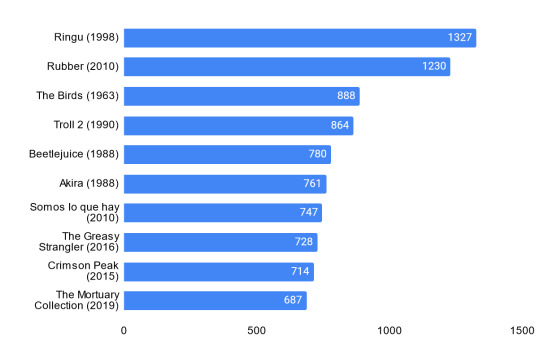
Ringu (1998) had the most votes with 1,327 votes. Chillerama (2011) had the least votes with 360 votes.
The 10 Most Watched Films by Percentage
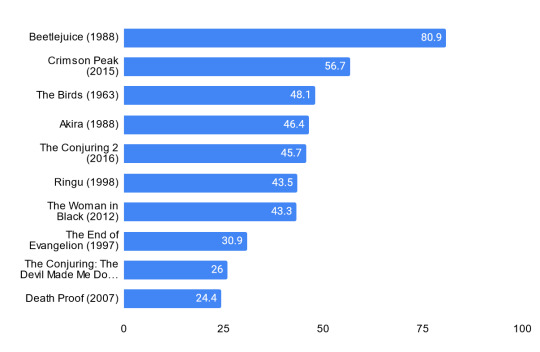
Beetlejuice (1988) was the most watched film with 80.9% of voters out of 780 saying they had seen it. Demonic Christmas Tree (2022) had the least "Yes" votes with 0.4% of voters out of 491.
The 10 Least Watched Films by Percentage
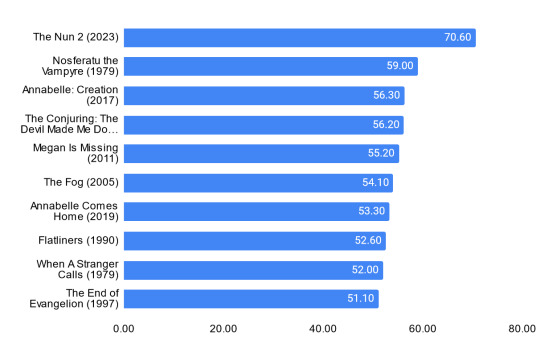
The Nun 2 (2023) was the least watched film with 70.6% of voters out of 633 saying they hadn’t seen it. Demonic Christmas Tree (2022) had the least "No" votes with 9.2% of voters out of 491.
The 10 Most Known Films by Percentage
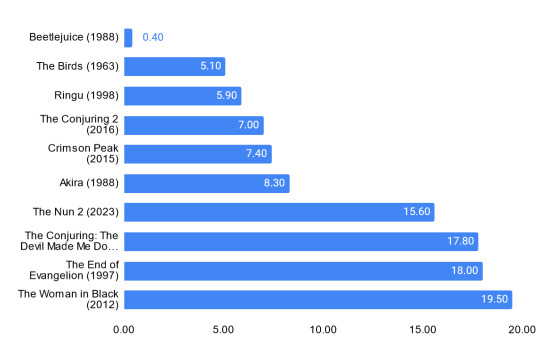
Beetlejuice (1988) was the best known film, only 0.4% of voters out of 780 saying they’d never heard of it.
The 10 Least Known Films by Percentage
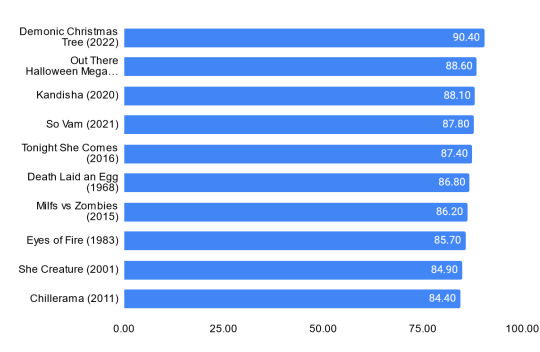
Demonic Christmas Tree (2022) was the least known film, 90,4% of voters out of 491 saying they’d never heard of it.
The movies part of the statistic count and their polls below the cut.
The Uninvited (1944) The Crazies (1973) Witchfinder General (1968) The Conspiracy (2012) When a Stranger Calls (1979) The Evictors (1979) The Birds (1963) Ice Spiders (2007) Rubber (2010) Eyes of Laura Mars (1978)
Daughters of Darkness (1971) Akira (1988) The End of Evangelion (1997) The Woman in Black (2012) Milfs vs. Zombies (2015) Knife + Heart (2018) It's a Wonderful Knife (2023) Attachment (2022) Gothic (1986) Jakob's Wife (2021)
Stranger by the Lake (2013) The Fog (2005) The Greasy Strangler (2016) Angel Heart (1987) Tumbbad (2018) The Snow Woman (1968) Sugar Hill (1974) Saloum (2021) WNUF Halloween Special (2013)
Sound of Violence (2021) Nosferatu the Vampyre (1979) The Haunting of Molly Hartley (2008) Death Laid an Egg (1968) Baskin (2015) The Last Will and Testament of Rosalind Leigh (2012) The Fearless Vampire Killers (1967) The Haunting of Julia (1977) The House That Dripped Blood (1971) Megan Is Missing (2011)
Ringu (1998) Three... Extremes (2004) Trench 11 (2017) Out There Halloween Mega Tape (2022) Henry: Portrait of a Serial Killer (1986) The Driller Killer (1979) Berberian Sound Studio (2012) One Cut of the Dead (2017) Demonic Christmas Tree (2022) Butcher, Baker, Nightmare Maker (1981)
Urban Legends: Bloody Mary (2005) Motel Hell (1980) Shallow Ground (2004) Annabelle: Creation (2017) Annabelle Comes Home (2019) The Conjuring 2 (2016) The Conjuring: The Devil Made Me Do It (2021) Morgan (2016) Sputnik (2020) Devil's Pass (2013)
Dracula's Daughter (1936) Dagon (2001) We Are Still Here (2015) We Are What We Are (2013) Somos lo que hay (2010) The Serpent and the Rainbow (1988) Midori (1992) The Believers (1987) Troll 2 (1990) Chillerama (2011)
The Town That Dreaded Sundown (1976) The Mortuary Collection (2019) The Little Girl Who Lives Down the Lane (1976) The Pit and the Pendulum (1991) House (1985) Flatliners (1990) The Town That Dreaded Sundown (2014) Crimson Peak (2015) Frailty (2001) Hell Night (1981)
Eyes of Fire (1983) Sister Death (2023) Tonight She Comes (2016) Bad Dreams (1988) Dead Snow (2009) Dead Snow 2: Red vs. Dead (2014) Veronica (2017) The Nun II (2023) Brotherhood of the Wolf (2001) Maniac (1980)
Man's Best Friend (1993) M.O.M. Mothers of Monsters (2020) The Reptile (1966) She Creature (2001) Beetlejuice (1988) The Incredible Melting Man (1977) Kandisha (2020) So Vam (2021) Bit (2019) Death Proof (2007)
9 notes
·
View notes
Text
Released September 9, 1983.
#Mortuary
#BillPaxton
#horror

25 notes
·
View notes
Text

Mortuary ~ 1983
#kmthirteen#skinetom#kmthirteenhorror#skinetom horror#horror#midnight spookshow#slasher horror#Slasher#80s slasher#89s basement horror
2 notes
·
View notes
Text
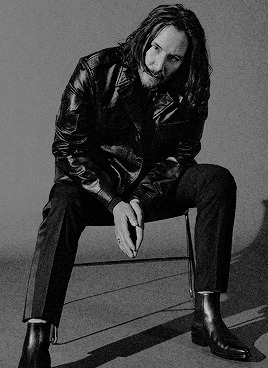

— BASICS
Name: Mikala Alijah Seabrooke, A.K.A. Michael or Mik. Age / D.O.B.: 58 / April 17th, 1965. Gender, Pronouns & Sexuality: Male in the same way you might view Cthulhu as a masculine figure, he / him / his, demisexual & aromantic. Hometown: Brooklyn, New York. Affiliation: The Syndicate. Job position: Organ trafficker (and other extracurricular activities), retired funeral director as of 2021. Education: Completed all 12 grades, acquired a health sciences degree at Kingsborough Community College at age 27 and a mortuary science degree at Hudson Valley Community College at age 32. Has undergone continuing education throughout his time working for funeral homes. Relationship status: Some secret third thing (weird marriage is the secret third thing). Children: None that he wishes to be aware of (two probably). Positive traits: + Articulate, confident, hardworking, methodical, persuasive. Negative traits: - Amoral, antagonistic, cruel, morbid, pedantic.
— BIOGRAPHY (CONTENT WARNING: military involvement, death, cruelty, murder, war crimes, torture, animal/human experimentation, gore, organ trafficking - it's just bad news bears under here, heed the warnings. Please refer to the abridged version w/o heavy mentions of these triggers if the content below is not for you.)
It’s spring of 1965 in Brooklyn, New York. A boy enters the world, healthy and screaming. He is the last born of three boys, and the only one to survive the following years, evading the Grim Reaper’s forceful grip. With a single mother and three boys with their own unique challenges, their family is unorthodox.
Mikala, or Michael as he’s known in social circles, is even more unorthodox. Childhood is simple enough, frustrating because he could never relate to his peers, not even his own brothers. An odd child, it starts the same as it always does—a general malaise towards the living, a penchant for experimenting with the dead. No one needs to know about the roadkill he conducts experiments on, so they don't.
He graduates high school in 1983, top of his class, then promptly enlists in the United States Army. It matters not to him that he lost both of his brothers, five and eight years his senior respectively, to war. Serving your country is merely what you did to make the men in your life proud and the women dote over you. Above all, he wants to feel—to kill.
Cut to 1985. He's twenty years old and feels so alive after witnessing so much death and depravity in a mere two years. He has a hostage. He should tell someone, he really should. But this is his capture, and so he doesn't. The torture lasts a handful of days, though it might as well have lasted a lifetime to his innocent victim. Interrogation leads to physical harm, lighting the match to a fiery path of torture, experimentation and, finally, death. Information acquired from his hostage is offered up to those positioned above him on a bloodied silver platter. Questions aren't asked, not for now.
Jump a few more years to 1989. He has completed his time in the military, not by choice. It's alleged that Michael committed multiple war crimes during his time serving, but only by a singular witness. The trial drones on for nearly a year, no evidence is found, and he walks as a free man amongst the innocents. His ability to lie and twist stories saves him multiple times throughout his life. Immediately after this, he enrolls into community college.
The next few years are uneventful, though he's intoxicated by power after winning his hefty case. He lives on the downlow by choice, having tasted plenty of murder in his time in the military. This changes at age 29 in 1994. In ice cold blood, he murders the woman he's dating. With attention to detail, he dissects and learns to preserve the human body, the organs within it.
He enters 1995 by enrolling into yet another community college, this time in mortuary science. Ten lovely years go by as he pursues his one and lonely passion, until he is noticed by The Syndicate. Wrong place, right time, or perhaps the other way around. In either case, Michael offers himself—his services—up. It takes a village to be this criminal and ruthless, and so he accepts the inherent shelter this organization provides. He trades his access to cadavers, more specifically organs, in return with the time-to-time involvement in assassinations, murders, and body disposal as well.
Throughout this time, starting in the mid-1990s, Michael discovers an inmate named Malachi Howahkan and does research on his case. Naturally, he likes what he finds, so he begins sending letters, money, et cetera to him. The two become romantically involved, going so far to propose to each other in their letters. Funnily, Malachi is the exact reason Michael enters The Syndicate in the first place, his soon-to-be husband in prison noticed and recruited first. When Malachi is released from prison in 2003, he shows up on Michael's doorstep. Just as naturally, he accepts his long-term penpal and partner, albeit with some surprise. Within the year, they're married.
From 2005 to 2021, life continues on as normal as it can for the abnormal. Summer of 2021 brings his retirement as a funeral director, a slightly controversial move, yet he's not lost access to what matters most in his position with The Syndicate. He finds alternative means, he always does.
As of 2023, he dedicates himself wholly to the gang, the only commitment that's ever mattered to him.
ABRIDGED VERSION: Born to a single mother, loses his brothers to war, enlists in the Army himself, commits multiple war crimes, is taken to court based on those war crimes, no evidence is found, he wins the case, acquires a degree in health sciences, murders woman he's in a relationship with shortly after graduating, acquires another degree in mortuary science, spends several years working in funeral services and participating in extracurricular activities on the side, discovers Malachi Howahkan while he's in prison and becomes his penpal, the two start a romantic relationship of sorts, they marry almost immediately after Malachi is released from prison, joins The Syndicate in 2005 due to his access to bodies, cements himself as an organ trafficker with occasional involvement in assassinations/murders, retires as a funeral director in 2021, continues his unscrupulous work for the organization.
— WANTED CONNECTIONS / PLOTS
Dalliances: It's rare for him to get intimately involved with someone, given his marriage, however it's not impossible. It's turbulent, it's hardly romantic, and it's all about gain—for him. He's using the person for one reason or another. Again, deets are worked out as we plot/write. (0 / 2) Ex-lovers: The dalliances that are no longer dallying. Again, quite rare for him to accumulate past lovers, but he's nearly sixty for God's sake and has been around the block once or twice. (0 / 2) Friends: Or whatever is the next best thing. These are people he doesn't mind, actively seeks out for company, etc. This is most often going to be other Syndicate members. Formal apology for the pet names said friends have garnered over time—think of them as his way of saying "I don't loathe you." Foes: He keeps his friends close and his foes closer. There are a million and one ways he could've wronged your muse and created this hostile attitude towards each other, so let's chat it out! Coworkers: A.K.A. beloved Syndicate members. He is particularly fond of those who get their hands bloody, and likely enlists their assistance in acquiring cadavers for organ trafficking purposes, delighted to take care of and dispose of the body for them. While he'll do the "acquiring" part himself, even after his retirement from the funeral home, he likes it more when he can get someone else to. Ex-coworkers could include other funeral service workers, hospital staff, etc. Military mates: Essentially, people who served at the same time he did (1983-1989). Doesn't have to be Army branch but it does help. Perhaps the one person to witness his war crimes and snitch? Children of Dracula: Alright, this is a little dramatic, but. Michael's kids that he doesn't have a connection with and never has, however perhaps they've reached out? Want to get to know estranged papa? They would be in their late 20s to early/mid 30s. (0 / 2) Cop who arrested him: Self explanatory. This is the police officer that took him into custody when he was accused for war crimes, maybe even believes he's guilty despite the verdict. Bad blood all around. (0 / 1) Lawyer who defended him: Again, self explanatory. Legal representation was his lifeline during his trial, and he likely feels as if he owes this person to this day. (0 / 1)
4 notes
·
View notes
Text
Seahenge: Research and history
youtube
Introduction:
This is an interesting video on Seahenge, which shows the importance of research when it comes to producing videos about history so that wrong information doesn't get out. Below is a cool description of what Seahenge is, why it had to be moved, and the history of the site.
"Seahenge, also known as Holme I, was a prehistoric monument located in Holme-next-the-Sea, near Old Hunstanton in the English county of Norfolk. A timber circle with an upturned tree root in the centre, Seahenge, along with the nearby timber circle Holme II, was built in the spring-summer of 2049 BCE, during the early Bronze Age in Britain.[1] Contemporary theory is that they were used for ritual purposes; in particular, Holme II has been interpreted as a mortuary monument that may originally have formed the boundary of a burial mound.
To preserve the timber in the site from exposure to air, due to recent exposure of the remains by the sea, it was excavated in the Spring of 1999,[2] and its remains were taken to an archaeological museum and then a maritime museum for the preservation of the wood. In 1999, a reproduction was put up by some of the excavators near the site. In 2008, after further study, a second reproduction was erected near the original's location. "
What did the video creator get wrong:
The video creator probably assumed that the USA and the UK when it comes to historic site laws, archaeology practices and the maintenance of historical sites, in general, are the same (it is probably a good idea to research the laws of another country before commenting on or visiting that country, otherwise you will make yourself an idiot or even worst, fined and arrested, I have heard of tourists visiting historic sites in other countries and being arrested for doing something stupid like damaging the historic sites, by the way, don't do that).
The video creator in this video also says that English Heritage stole the Seahenge Historic site, I think this video creator needs to research the role of English Heritage at the time the incident happened and UK heritage laws, by doing so. they would know that at the time of these events, English Heritage did have the legal right and power to remove the Seahenge under UK Law (to save the site),.
But it seems English Heritage didn't use their powers in this case they were invited by the appointed person of the site to advise them what to do and did not just barge in and take it, English Heritage and the appointed person engaged to look after the site, agreed together that the Historic site needed to be removed for its safety.
There seems to be some rubbish on the Internet these days that English Heritage stole the seahenge, but this is untrue, English Heritage did not steal anything (in fact they saved it as people and the sea were destroying it, plus it was an Archaeology unit engaged to do the work who removed the seahedge not English Heritage they only advised to do so after the appointed person of the Seahenge agreed to do so).
"When originally formed in 1983, English Heritage was the operating name of an executive non-departmental public body of the British Government, officially titled the Historic Buildings and Monuments Commission for England, that ran the national system of heritage protection and managed a range of historic properties. It was created to combine the roles of existing bodies that had emerged from a long period of state involvement in heritage protection. In 1999, the organisation merged with the Royal Commission on the Historical Monuments of England and the National Monuments Record, bringing together resources for the identification and survey of England's historic environment."
Now, Historic England takes on the executive powers of English Heritage
"On 1 April 2015, English Heritage was divided into two parts: Historic England, which inherited the statutory and protection functions of the old organisation, and the new English Heritage Trust, a charity that would operate the historic properties, and which took on the English Heritage operating name and logo. The British government gave the new charity an £80 million grant to help establish it as an independent trust, although the historic properties remain in the state's ownership. "
I also remember the events of the removal of the seahenge being filmed for the UK programme Time Team where UK archaeologists discussed the site, the main archaeologist I think was discussing the site was Francis Pryor then director and lead archaeologist of Flag Fen where the seahenge ended up, and the reason for removing it was to save it.
Also, there is a big difference between moving or stealing, historic sites or. objects from another country or culture, and moving a historical site you already own to save that historic site.
By the way, I love this video creator's content and I recommend their videos, so check them out. They just got the information in this video wrong. Usually, their content is correct.
Seahenge references:
Seahenge - Wikipedia
Seahenge, An Extraordinary Historical Discovery in Norfolk
English Heritage - Wikipedia
Another video about the Seahenge this time an eyewitness account by someone involved in the Seahenge removal event:
youtube
0 notes
Text
Sometimes, Access Needs To Be Denied
I found this saying on the FB feed of an old classmate and decided it was with sharing. Jeff was President of our class back at the Cincinnati College of Mortuary Science in 1983-84 and I was President of Pi Sigma Eta, our professional fraternity. While we have not gotten together since graduation, we have monitored each other via social media over the years and are like-minded in many ways, You…

View On WordPress
1 note
·
View note
Text
DEAMBULANDO POR CRYSTAL LAKE 101
MORTUARY (1983)

0 notes
Text
«────── « HEADCANON » ──────»
Here's my headcanon that I have for Tony Prince surrounding his homosexuality and the culture he seems to have grown up in.
CW / TW for: Homophobia, Police Brutality, Prison Culture, Sexual Acts, and Drug Abuse.
According to Tony’s wiki page, which cites information found within the games and the overall “lore” of Grand Theft Auto, Tony was never openly gay until 1985:
“ The first club Tony opened for himself was PUDDLE, a rave venue famously located in a converted mortuary, until it was shut down when Tony was arrested for tax evasion in 1985, spending 3 months in jail. According to Luis, Tony also first earned the nickname “Gay Tony” in 1985 - as the nickname suggests, Tony became openly homosexual by the time he was 27. “
Now obviously there isn’t a lot of history depicted up until this point, the only other notable things really being that Tony was born in 1958 in Dukes (the Grand Theft Auto equivalent of Queens, a borough in New York state), and he hated it there. A lot:
“ According to the Maisonette 9 website, “as a young boy, he wandered to the Humboldt River and dreamed of living on the other side (in Algonquin) so he would no longer be considered bridge and tunnel”. He also used to play in front of the Monoglobe and would sometimes stare into it, wondering what life was like in different countries. He is ashamed of his Dukes background, and it’s hinted during the beginning of Departure Time that he doesn’t speak to his parents anymore. “
However, with how much the Grand Theft Auto series likes to pull from reality (and dramatize it as a form of criticism), and as I’m a gay male myself, I want to assume that Tony did not have a realization that he was gay in 1985, but rather was able to feel proud about coming out in 1985 (re: he knew he was gay but repressed it).
Let’s bullet point some LGBT+ history from New York state between roughly 1969 - 1985, as Tony would be between ages 11 - 27 respectively during this time period:
1969 (Age 11): Stonewall Riots happened in Greenwich Village. The Stonewall riots were a series of violent conflicts between gay men, drag queens and lesbians against a police officer raid* in New York City. Riots began as police raided the inn.
1970 (Age 12): Commemorative march held one year after the riots, organized by the impetus of Craig Rodwell, owner of the Oscar Wilde Bookshop, drew 5,000 marchers up New York City’s Sixth Avenue, which drew nationwide publicity and put the Stonewall events on the historical map and led to the modern-day pride marches.
1971 (Age 13): In 1971, the first version of the Sexual Orientation Non-Discrimination Act (passed 2002; Age 44) was introduced into both houses of the state legislature.
1974 (Age 16): The Village of Alfred became the first municipality in the state to pass a gay rights ordinance, which prohibited discrimination on the basis of sexual orientation.
1977 - 1979 (Ages 19 - 21): Gaysweek existed as the first openly LGBT weekly newspaper in New York. At the time, it was one of only three weekly LGBT publications in the world, and the first to be owned by an African-American.
1980 - 1983 (Ages 22 - 25): The New York Court of Appeals case New York v. Onofre abolished most remaining laws regarding sodomy in New York. In 1983, the Lesbian, Gay, Bisexual & Transgender Community Center was established in New York City (borough: Manhattan).
1985 (Age 27): The Gay & Lesbian Alliance Against Defamation was formed by a group of gay and lesbian artisans in New York City (borough: Manhattan).
* NOTE: Law enforcement officials could legally raid LGBT+ oriented establishments on the behalf of the anti-gay accommodation rules of the NY State Liquor Authority, who had said it was illegal for homosexuals to congregate and be served alcoholic beverages in bars. Bars that did operate would have to bribe either the police or local mafias. These regulations were legally overturned between 1965 and 1966, however, just because it was changed did not mean the police adhered to it at all.
So from what can be gleaned, it really would make sense that Tony was never openly gay from the moment he may have realized that. I mean, in Grand Theft Auto IV which takes place in 2008, we still see Tony being called a fag, fairy, and queen by numerous people. He still actively faces discrimination, however it’s not nearly as bad as it was.
Yet we’ll delve into the modern history later, let’s focus now on Tony earning the nickname and his three months in jail in 1985.
Tony went to jail in 1985 for tax evasion and served three months. It’s a bit of a stretch to draw a connection to Tony’s “coming out” and his time in prison, yet it’s not an impossible thing and I personally see the two being connected given their timeframe.
Sexual behaviors in prisons/jails often include:
Suppression, in which an inmate chooses celibacy (i.e. refrains from sexual activity while in prison, most commonly to stay loyal to a partner who is outside of prison)
Autoeroticism (i.e. masturbation)
Homosexuality (which consists of two types, consensual true and consensual situation. Consensual true occurs between people who were already homosexual before entering prison. Consensual situation occurs between people who have homosexual experiences for the first time in prison)
Sexual violence (which includes coercion, manipulation, and compliance. Manipulation is performed for power or some kind of reward. Compliance occurs to obtain safety, protection, or out of fear).
** NOTE: A small disclaimer before I go any further, a lot of the above applies to prison culture. The distinction between a jail and a prison is the severity of the crime and sentences served. Tony went to jail because he only served three months. If his sentence was one year or greater, he would have gone to prison. Granted, the culture tends to be fairly similar across both institutions, dependent on the population (types of inmates).
The interesting thing in Tony’s case is that given the interactions he had behind bars, if any himself, were consensual, he can apply to both the consensual true and consensual situation model. With how rough the culture surrounding LGBT+ individuals and dating was up to this point, it’s hard to imagine he had any sort of intimacy with another male, yet he has recognized that he is gay, yet has also not come out. If he had any interactions during this time, then that would have most likely been his first. The only thing I can assume that would lead to him earning the nickname “Gay Tony” during the course of 1985, and his consequent coming out, would be that he has had intimate relations within that three-month period, and it became a “brand” from his jail time, so to speak, as giving inmates nicknames based on whatever attributes makes them notable is very common even to this day.
It could also be entirely coincidental, but that’s what headcanons are for.
And since we’re here, let's look at some of New York’s LGBT+ history in the early 2000s:
2002 (Age 44): The Sexual Orientation Non-Discrimination Act was passed by the Legislature. Governor George Pataki signed the bill into law, and it went into effect on January 16, 2003 (Age 45).
2005 (Age 47): The Queens Chapter of PFLAG announced the creation of the “Brenda Howard Memorial Award”. This was the first time a major American LGBT organization named an award after an openly bisexual person.
2008 (Age 50): Governor David Paterson issued a directive for all government agencies to recognize same-sex marriages performed in other states of the Union where such marriages are legally certified.
TLDR:
Tony earned the nickname “Gay Tony” while serving time in jail and becoming a “prison bitch”.
Also, Tony is an older gay male who did not have the privilege to openly express himself and pursue healthy relationships until he was older (and therefore more likely to be excluded and feel ostracized by the emerging crowd of “baby gays”), and this is part of why he tends to seek risky and abusive relationships, as well as abuse drugs, despite being “old enough” to know and acknowledge how these things hurt him.
#(headcanon)#(m: tony prince)#(tw: homophobia)#(tw: police brutality)#(tw: substance abuse)#(long post)
1 note
·
View note
Photo








Bill Paxton as Paul Andrews in Mortuary (1983)
#bill paxton#mortuary#mortuary 1983#80s horror#horroredit#my gifs#long post#im in my bill paxton phase meaning time to gif his films
466 notes
·
View notes